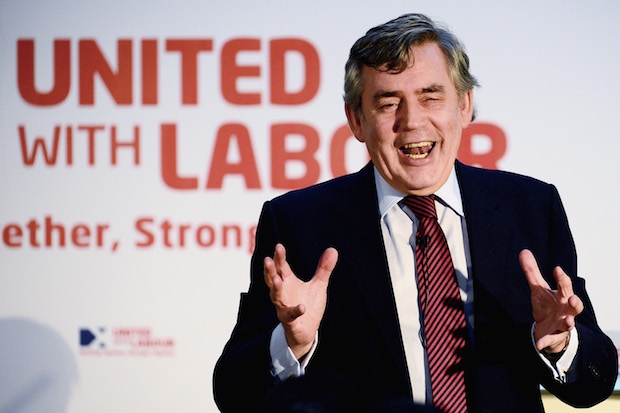The longer the Scottish referendum campaign goes on, the more I fear for the long-term future of the Union. I suspect that the pro-Union campaign will win this September, but the way in which they will do this is storing up problems for the future.
The pro-Union campaign has, so far, concentrated on two messages: the dangers of independence and the fact that there’ll be more devolution if the Scots vote no to independence. These tactics will help with this September’s referendum—indeed Hamish Macdonell argues persuasively that a ‘devo plus’ offer would deliver victory. But strategically they are storing up problems for the future.
Gordon Brown is today proposing a whole slew of extra powers for the Scottish parliament. If the Brown blueprint was implemented, it would exacerbate the problems posed by the West Lothian Question. At the moment, the West Lothian Question doesn’t really bother the rest of the United Kingdom. But if pushed too far, they’ll be a backlash at the asymmetrical nature of these arrangements.
There’s more merit to Ming Campbell’s suggestion of Home Rule for all the constituent parts of the UK. But given that England makes up just over 80 percent of the UK’s population it is hard to see how that would not lead to a power struggles between the English Parliament and Westminster and the English First Minister and the British Prime Minister.
The lesson of devolution is that we tamper with the constitutional framework of the United Kingdom at our peril. But all the major political parties seem intent on continued tactical constitutional tinkering. It is hard to see how this doesn’t end in disaster.
PS From Fraser Nelson Brown’s involvement is perhaps the worse news the ‘no’ campaign has had this year. It suggests a squabble with Alistair Darling, who’s running Better Together (Brown is speaking under the auspices of the separate United With Labour). Unlike Darling, Brown will unnerve the ‘tartan Tories’, the former Conservatives who switched to the SNP. Ever the partisan, Brown’s speech today is trying to slip a Labour agenda into the slipstream of the ‘no’ campaign.
Brown suffers from a messiah complex, seeing himself as some kind of saviour. But as the 2006-10 period demonstrated, he repels voters in Scotland as much as he did in England. At one stage, Brown was living in a LibDem constituency because his intervention in the Dunfermline by-election was decisive against Labour, and in a country governed by the SNP after he worked his reverse midas touch on the 2008 Holyrood campaign. Labour held out in Scotland, but that was in spite of Brown.
Brown is a decent tactician, but a dreadful frontman. He’s just the chap the SNP need if they want to pitch the referendum as a decision between the future, or the past. Short of a reincarnated Edward Longshanks, I can’t think of anyone Alex Salmond would rather be up against.







Comments